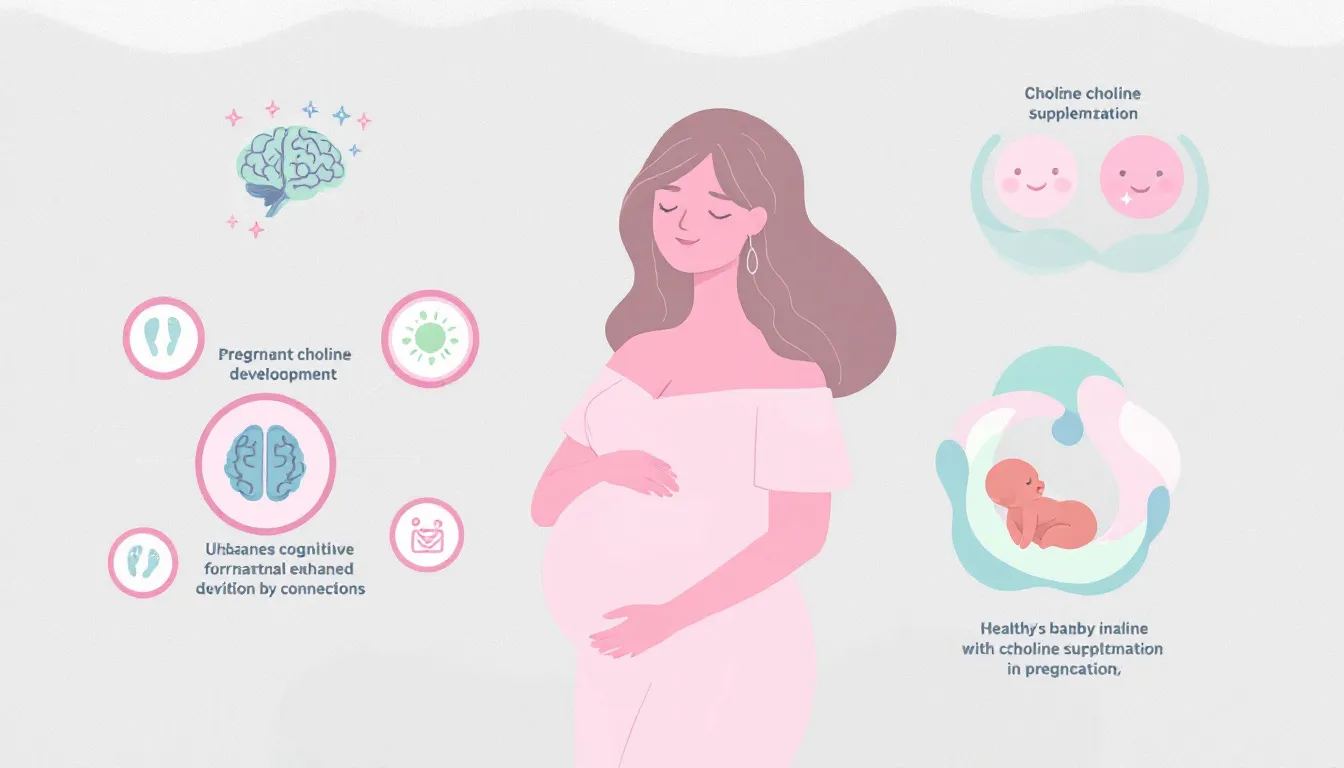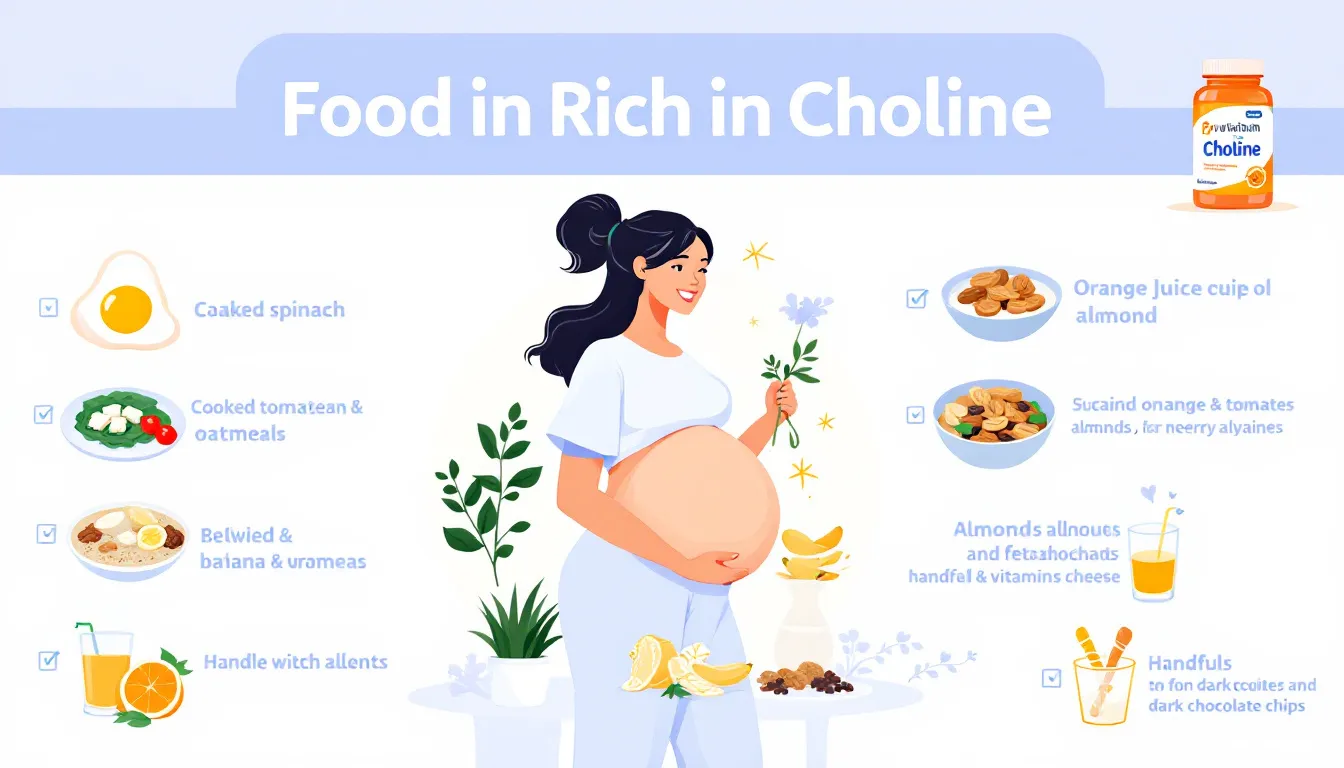Choline is crucial during pregnancy. It supports fetal brain development and maternal health. Many pregnant women don’t get enough choline. This article shows why choline pregnancy matters and how to ensure adequate intake.
Key Takeaways
- Choline is crucial for fetal brain development, cell growth, and prevention of congenital disabilities during pregnancy; however, many pregnant women do not meet the recommended intake.
- Maternal choline supplementation can significantly enhance cognitive development in children and reduce pregnancy complications, with specific intake recommendations of 450 mg for pregnant women and 550 mg for breastfeeding mothers.
- To increase choline intake, pregnant women should focus on consuming choline-rich foods like eggs, dairy, and lean meats, along with appropriate supplements when dietary sources are insufficient.
The Importance of Choline During Pregnancy

Choline is a powerhouse nutrient essential for neurocognitive development before and after birth. During pregnancy, it significantly impacts fetal brain development, aiding the formation and integrity of brain cells. Choline-derived phospholipids are fundamental for rapid cell division, growth, and myelination, processes that are vital for the developing fetus.
The demand for choline surges during pregnancy alters choline dynamics due to increased estrogen levels and a heightened metabolic rate. However, most pregnant women consume less choline than the recommended amount, highlighting a significant gap in dietary intake. This shortfall can have far-reaching consequences, affecting both maternal and fetal health.
Public health initiatives should aim to increase awareness among expectant mothers about the importance of choline during pregnancy. Maternal choline intake influences several health outcomes for both mothers and babies, making it crucial to close this intake gap. Choline content in breast milk also affects infants’ circulating choline levels, further underscoring the nutrient’s significance.
Maternal Choline Supplementation Benefits

Maternal choline supplementation can bring about numerous health benefits for both the mother and the developing baby. It can improve several pregnancy outcomes and protect against certain neural and metabolic insults. Supplementation during pregnancy enhances fetal brain development and provides neuroprotection.
Choline supplementation can reduce the incidence of congenital disabilities and improve cognitive outcomes in children, as choline intake beneficially influenced is particularly important given the critical role choline plays in brain development.
Breastfeeding mothers should aim for a daily choline intake of 550 mg to support both their health and their infant’s development.
Cognitive Development and Brain Function
Choline is indispensable for fetal brain and spinal cord development, serving as a cornerstone for healthy brain and cognitive development. A deficiency in this nutrient is linked to adverse effects on fetal brain development and cognitive function, potentially affecting a child’s learning capabilities and memory long-term.
Maternal choline supplementation positively influences cognitive development in children post-birth. Research indicates that choline plays a critical role in fetal memory and learning capabilities, leading to improved attention and memory in children. These findings underscore the importance of adequate choline intake during pregnancy to support optimal brain function and cognitive performance in the offspring.
Reducing Pregnancy Complications
Choline is vital for forming the neural tube, which significantly impacts brain and spinal cord development. Adequate maternal choline supplementation is linked to reduced risks of neural tube defects in developing babies. Insufficient choline during pregnancy increases the risk of these defects, emphasizing the need for adequate levels of this nutrient.
Beyond neural tube defects, adequate choline intake supports healthy placental function, critical for nutrient transfer to the fetus. This supports preventing certain pregnancy complications and ensures better overall pregnancy outcomes. Pregnant women should prioritize choline intake to support fetal development and reduce the risk of complications.
Recommended Choline Intake for Pregnant Women
Pregnant women should aim for a daily intake of 450 mg of choline, while breastfeeding women should consume 550 mg daily. Despite these guidelines, only 8.5% of pregnant women consume the recommended amount of choline, indicating a significant gap in intake. This gap is concerning given the crucial role of choline in fetal development and maternal health.
High sources of choline include:
- Beef
- Eggs
- Chicken
- Fish
- Pork
- Dairy products, with cow’s milk being a primary contributor to dietary choline intake in the U.S.
Pregnant women should include these foods in their diets to ensure adequate choline intake.
Healthcare providers can assess individual dietary habits and recommend strategies to increase choline intake tailored to each pregnant woman’s needs.
Sources of Choline: Food and Supplements

Pregnant and lactating women should consume choline-rich foods to ensure adequate choline intake. Choline is essential for supporting fetal brain development and maternal health.
When food sources are insufficient, dietary supplements and a choline supplement can help meet daily choline requirements.
Choline-Rich Foods
Including eggs, particularly the yolks, is one of the most effective ways to boost choline intake, providing around 125 milligrams of choline per large egg. Lean cuts of meat such as beef, chicken, and pork are rich sources of choline that can significantly enhance daily intake.
Seafood, including fatty fish like salmon and cod, provides significant choline along with beneficial omega-3 fatty acids. Dairy products like milk and yogurt are useful choline sources and should be incorporated into daily meals.
Vegetarians and vegans can obtain choline from plant sources such as soybeans, quinoa, and peanuts. Including a variety of these choline-rich foods in the diet can help ensure adequate intake during pregnancy.
Choline Supplements
Choline supplements come in various forms, including:
- Phosphatidylcholine
-
Choline Bitartrate
- Phosphocholine
- Sphingomyelin
These forms can influence health benefits and absorption rates in the body. Choline supplements can vary significantly in their composition and effectiveness depending on the form.
Most prenatal vitamins lack adequate choline amounts, necessitating additional supplementation for proper intake. For pregnant women who struggle to meet dietary recommendations, a prenatal vitamin and choline supplements offer a concentrated source of this essential nutrient.
How to Increase Choline Intake During Pregnancy

Incorporating a variety of choline-rich foods into the diet is essential for meeting the increased choline needs during pregnancy. Foods high in choline include eggs, liver, chicken, fish, and dairy products. These foods should be regularly included in meals to ensure adequate intake.
In addition to food sources, choline supplements can help pregnant women meet their daily needs, especially when dietary intake is insufficient. Common choline supplements include phosphatidylcholine, choline bitartrate, and alpha-GPC, each with specific dosage recommendations.
Combining choline-rich foods with an appropriate supplement can effectively boost daily choline intake and support pregnancy health.
Impact of Choline Deficiency on Pregnancy Outcomes

Inadequate choline can compromise maternal health by increasing inflammation and stress levels. Choline deficiency in pregnant women is linked to elevated risks of maternal and fetal health complications. These complications can include severe congenital disabilities such as neural tube defects.
Overall choline deficiency can lead to significant adverse effects for both the mother and the developing fetus. Adequate choline intake during pregnancy is crucial for preventing these risks and supporting healthy pregnancy outcomes.
Research and Future Directions
Current research on choline and pregnancy outcomes is limited, with few randomized controlled trials and incomplete understanding of dose-response relationships. Studies show that higher choline intake (900 mg/d) in pregnant women leads to improved pregnancy outcomes, including better neonatal stress reactivity, faster processing speed, and improved memory in children.
Existing studies face challenges like methodological inconsistencies and variable findings regarding choline’s effects on pregnancy outcomes. Future studies should focus on the optimal timing and dosage of choline supplementation to maximize its benefits for both mother and child.
Choline + DHA: Enhancing Benefits with DHA
Combining choline with DHA can significantly improve outcomes, particularly in infant brain development and memory. Research shows that when choline levels are elevated alongside DHA intake, infants exhibit improved recognition memory.
DHA plays a crucial role in synapse formation and cognitive enhancement, complementing choline for optimal results. Studies suggest that the combination of choline, DHA, and lutein could be the 'secret sauce' for supporting cognitive function in infants. Additionally, the presence of choline in human milk continues to aid fetal and infant brain development throughout the first year of life.
Choline works synergistically with DHA and lutein, enhancing infant brain development and memory. Research indicates that higher choline levels, when combined with DHA, are associated with improved recognition memory in infants.
DHA enhances synapse formation and cognitive abilities, working alongside choline for optimal results. Studies suggest that the combination of choline, DHA, and lutein may provide a ‘secret sauce’ supporting cognitive function in infants. Choline in human milk further supports fetal and infant brain development throughout the first year of life.
Summary
Choline is a vital nutrient that plays an indispensable role during pregnancy. From supporting fetal brain development to reducing the risk of pregnancy complications, the benefits of adequate choline intake cannot be overstated. Despite its importance, many pregnant women do not consume enough choline, highlighting the need for increased awareness and dietary adjustments.
Maternal choline supplementation has been shown to improve pregnancy outcomes, enhance cognitive development in children, and support maternal health. Including choline-rich foods in the diet, along with supplements when necessary, can help meet the recommended daily intake and ensure both mothers and babies receive the full benefits of this essential nutrient.
As research continues to uncover the long-term impacts of choline on child development and maternal health, it becomes increasingly clear that choline should be a priority in prenatal nutrition. By understanding the importance of choline and taking proactive steps to ensure adequate intake, expectant mothers can provide the best possible start for their babies.
Frequently Asked Questions
How much choline should pregnant women consume daily?
Pregnant women should consume 450 mg of choline daily to support fetal development. Meeting this requirement is crucial for the health of both mother and baby.
What are some good dietary sources of choline?
Choline-rich foods you should consider include eggs, lean meats like beef and chicken, seafood, dairy products, soybeans, quinoa, and peanuts. Incorporating these into your diet can help you meet your choline needs effectively.
Can I rely on prenatal vitamins for my choline intake?
You cannot solely rely on prenatal vitamins for adequate choline intake, as most do not provide sufficient amounts. It may be necessary to consider additional choline supplements.
What are the benefits of combining choline with DHA during pregnancy?
Combining choline with DHA during pregnancy significantly enhances infant brain development and cognitive function, leading to better recognition memory in infants. This synergy supports optimal neurological outcomes for your child.
What are the risks of choline deficiency during pregnancy?
Choline deficiency during pregnancy significantly heightens the risk of maternal and fetal health complications, such as neural tube defects and congenital disabilities. Ensuring adequate choline intake is essential for the health of both mother and baby.

